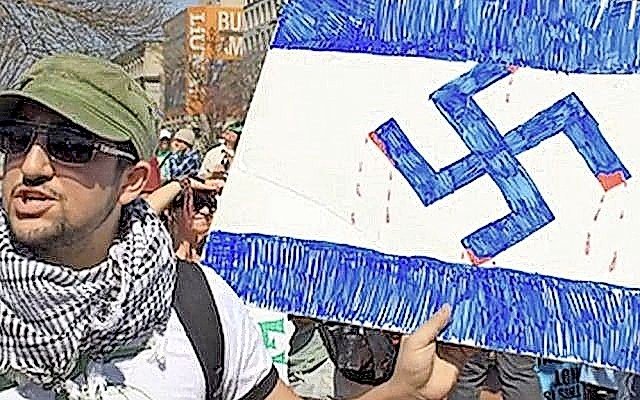State of siege
On tap in 2022: More woke-fueled campus hostility
Pro-Israel groups working on campus agree that the situation for Jewish students is growing steadily worse. Just this fall, anti-Semitic incidents erupted at campuses across the country — from vandals desecrating a Torah scroll at George Washington University to a student at the University of New Mexico hospitalized after being attacked by a group shouting anti-Semitic slurs.
“At USC, we saw a member of student government threaten to ‘kill Zionists’ without repercussion while a Jewish member of student government was harassed into resigning her position,” David Brog, executive director of Maccabee Task Force (MTF), told JNS. “As students return to campus this spring, we must be prepared for similar outrages.”
One in three Jewish college students said they personally experienced anti-Semitism in the last academic year, according to the ADLHillel Campus Antisemitism Survey: 2021.
“It’s gotten much worse since I started in 2008 with CAMERA — much worse,” Aviva Rosenschein, CAMERA’s International Campus Director, told JNS. “It’s much more intimidating on the campuses.”
Three campus groups JNS spoke with — MTF, CAMERA on Campus, and the Israeli-American Council’s Mishelanu — pursue different strategies to fight back against an increasingly anti-Israel environment.
Rosenschein described CAMERA campus’s strategy as two-fold:
1) to educate students on current issues; and
2) to respond to anti-Israel attacks.
The second point reflects CAMERA’s reputation for fact-based refutation of false or distorted reports about Israel in the media.
“There’s no other organization focusing on the campus newspapers,” said Rosenschein.
CAMERA is represented on campus by Fellows, one or two per campus, and a coalition of independent, pro-Israel student organizations which CAMERA supports with funding for programming and educational materials. CAMERA is active on more than 80 campuses via both the Fellows and the coalition.
The group’s Fellows respond to inaccurate articles with carefully researched ones of their own “so that the general student body is actually reading another point of view and a more factual account.”
CAMERA on Campus Fellows will also attend events by anti-Israel speakers and confront them with questions.
“It’s not easy because at a lot of these events most of the attendees will be supporters of the speaker,” Rosenschein said. The Fellows then write about those events, “fact-checking and refuting false claims spread by the speaker, sometimes exposing anti-Semitic rhetoric shared at the event.”
“The only way we can really hope to change anything on campus is by building coalitions with influential student groups and members of student government,” said Brog, a longtime pro-Israel activist and former executive director of Christians United for Israel.
Brog said methods that once worked no longer do, blaming an “increasingly siloed political environment” as “people really just make friends with those who share their political worldview and consume media and social media that affirms their worldview.”
The default political worldview on campus is far-left, and within that worldview Israel sits squarely in the negative, he said.
His organization has found that the most effective tool to shake people out of their political comfort zones is a trip to Israel. The trip is for campus leaders — not primarily Jewish students — “who influence the direction of the political debate on campus.”
“The difference between the anti-Israel narrative they’ve been fed and the reality, even on a bad trip, is transformative.”
“If you get them on a bus where they’re actually seeing Israel and hearing from Israelis and Palestinians, well, then they’re going to be exposed to something they’ve never been exposed to before, and likely never would have been exposed to,” he said.
Another group that’s become active on campus is the Israeli-American Council (IAC), an organization of first- and second-generation Israelis in America, which launched a college department in 2020 called Mishelanu.
Justin Feldman, national activism manager for Mishelanu, said the focus of the program, now at almost 100 colleges, is convincing pro-Israel students to become more engaged in student government in the hope of creating a campus environment friendlier to Jews and Israel.
Mishelanu also focuses on what Feldman calls a personalized approach to Israel education.
Feldman, Brog and Rosenschein agree that the main anti-Israel groups are Students for Justice in Palestine (SJP), a pro-Palestinian student activist group, and Jewish Voice for Peace (JVP), a pro-BDS, anti-Israel group, whose goal is weakening American Jewish support for Israel. J Street U, while officially pro-Israel, also tends to be hostile.
Rosenschein said the biggest problem on campus is the faculty which is “if not the main source, one of the key sources of the anti-Zionism. They are indoctrinating the students.”
She says faculty advisers encourage students to form anti-Israel organizations and intimidate students in Middle East studies classes if they have a different perspective.
“The professors are a huge problem that has been an issue for decades but recently has openly exploded,” said Rosenschein.
To deal with the problem, CAMERA has formed the CAMERA Education Institute, which reviews professors’ syllabi, refutes them when necessary, and is also in the process of creating its own syllabi to offer to schools.
Brog says the main problem on campuses today is the woke, progressive worldview. Almost everyone who leans progressive embraces an anti-Israel narrative, he said, and “it creates an enormous challenge for us now because it’s not a matter of trying to counter a bad professor or an SJP event. Now, we’ve got to push back against an entire political worldview.”

 57.0°,
Fog/Mist
57.0°,
Fog/Mist 




